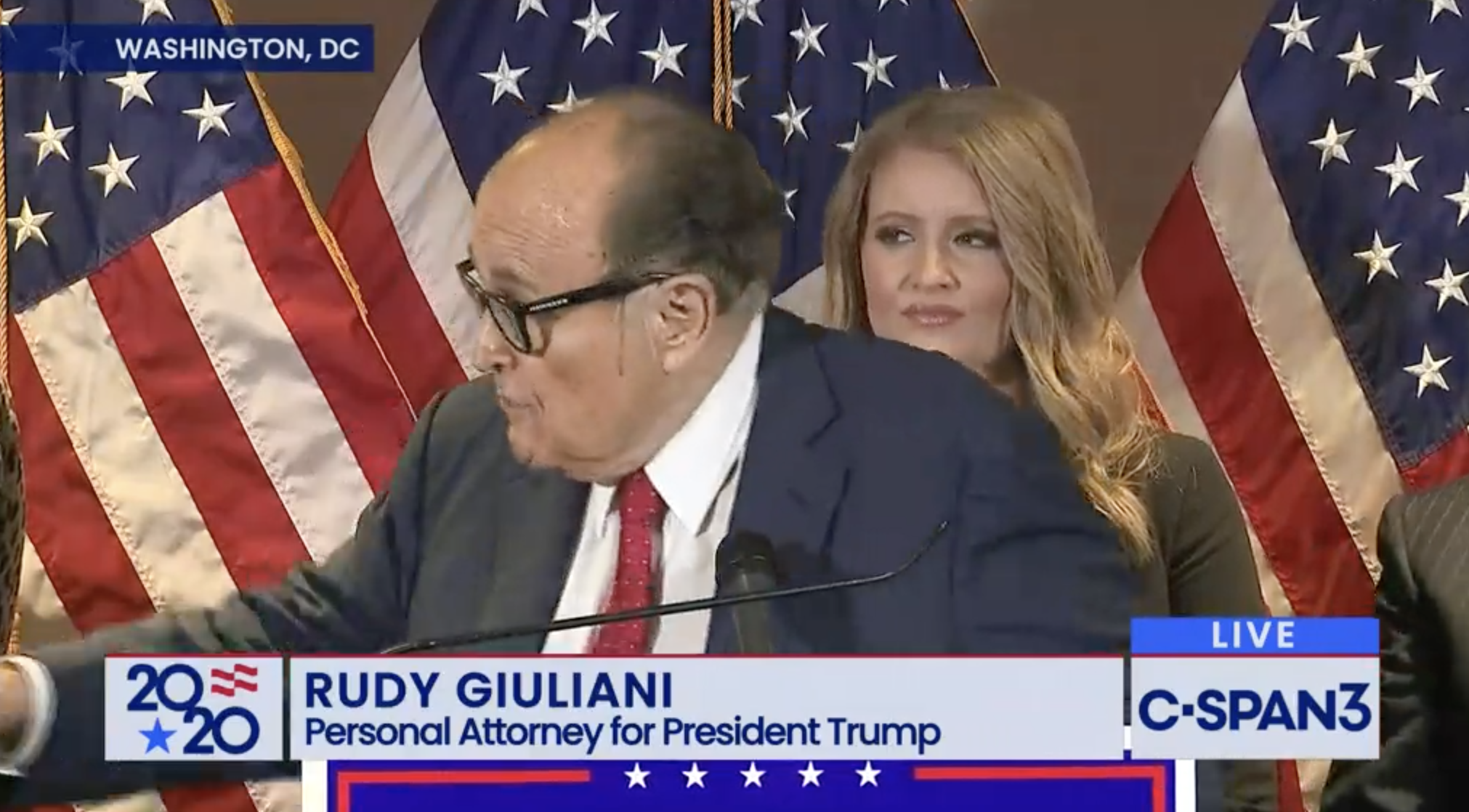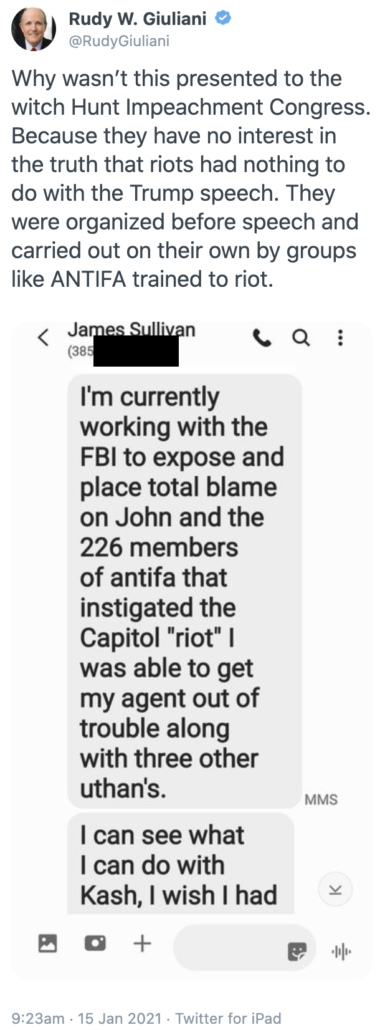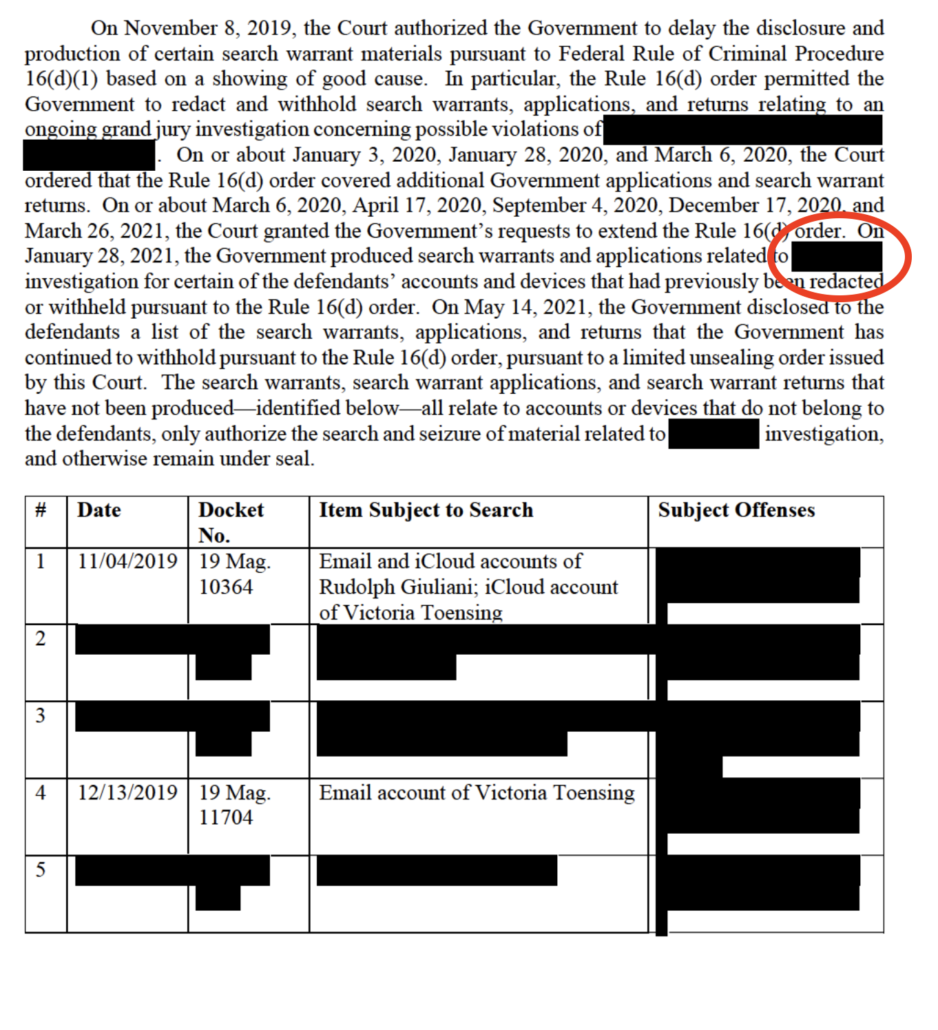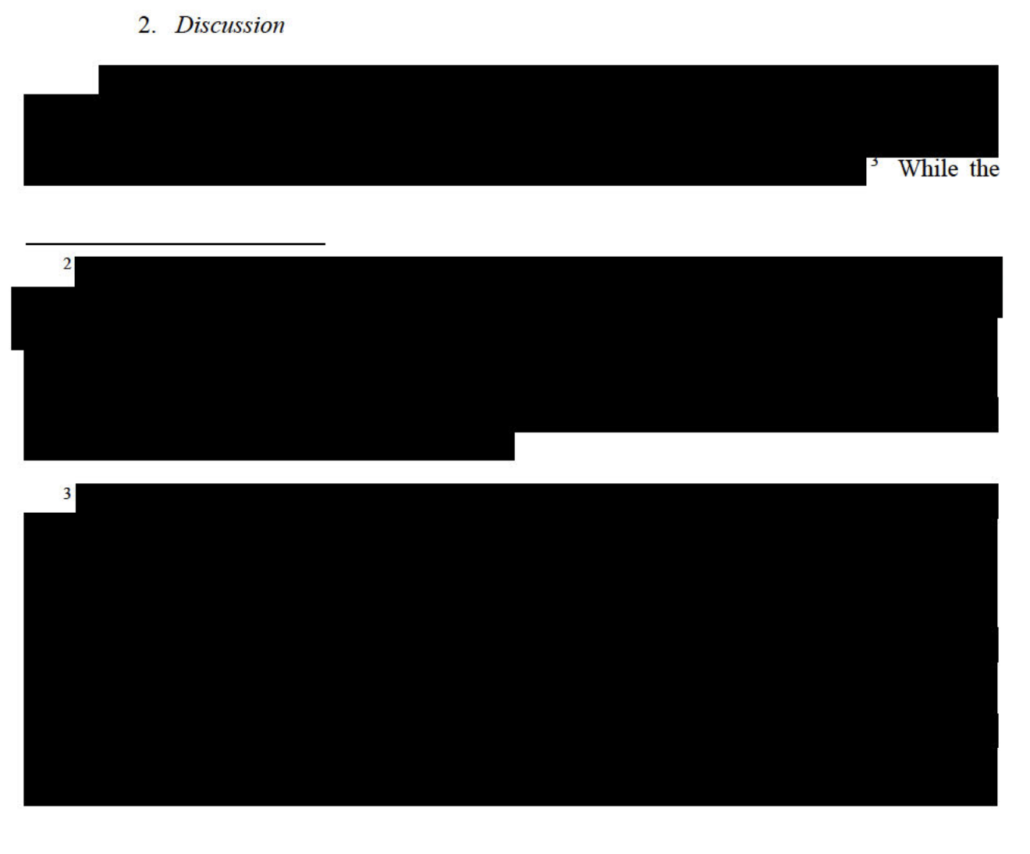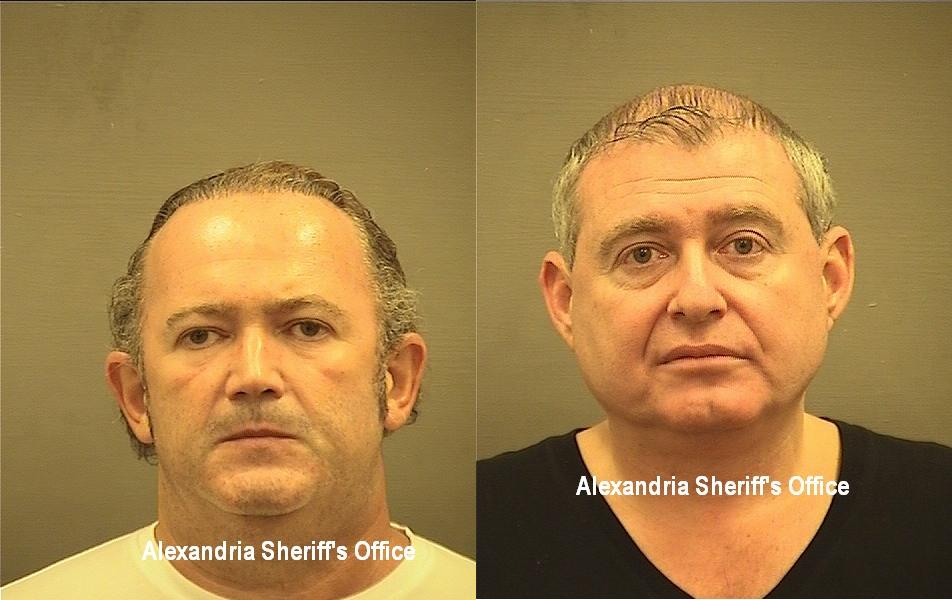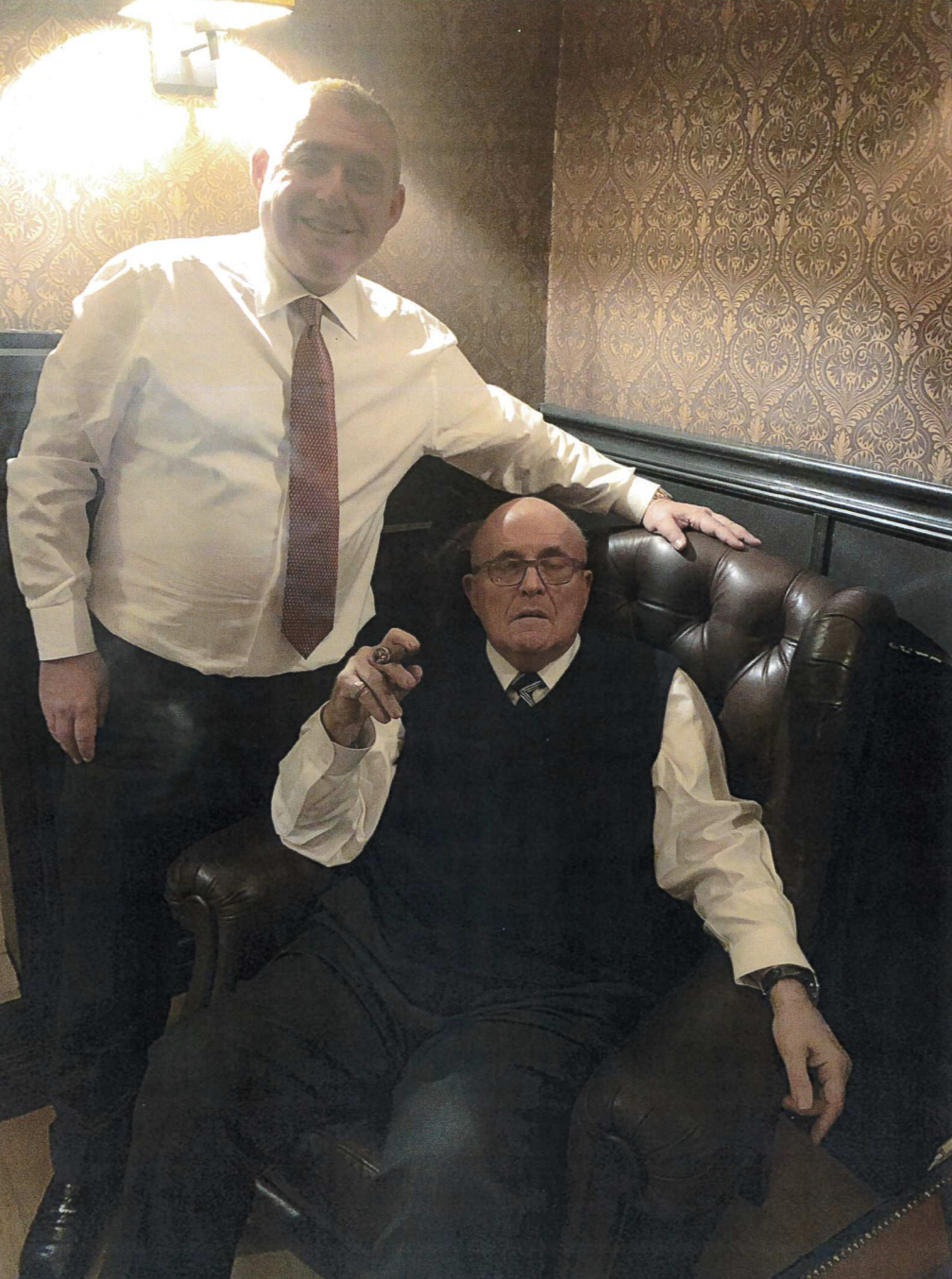How SDNY Came to Treat James O’Keefe Better than Former SDNY US Attorney Rudy Giuliani
It has been a week since Judge Analisa Torres appointed Barbara Jones as Special Master to review materials seized from James O’Keefe and two other Project Veritas figures, and prosecutors from the Southern District of New York have not made any public complaint to the terms of her order. So I’d like to emphasize what SDNY found tolerable in the Project Veritas matter as compared to the search of Rudy Giuliani’s phone.
These are the instructions Judge Torres issued for the Special Master review of Project Veritas’ devices.
- The Government shall complete extraction of the materials from Petitioners’ devices. The Government shall provide the extracted materials to the Special Master.
- The Special Master shall expeditiously conduct an initial review of the extracted materials to determine what materials are responsive to the search warrants. To assist with the Special Master’s review, the Government shall provide the Special Master, on an ex parte basis, with a copy of the search warrants executed on Petitioners, the underlying application materials for those search warrants, and any other information that will assist the Special Master in conducting her review. If the Special Master determines that the efficient administration of her duties requires the assistance of additional professionals, support staff, or expert consultants, she may submit a work proposal to the parties, who will have five business days to submit comments, after which time the Special Master may then submit the proposal to the Court for consideration.
- Materials deemed to be responsive to the search warrants shall be provided by the Special Master to the filter team, which shall be walled off from the investigative team working on matters related to the investigation that is the subject of the search warrants or any investigation related to Petitioners.
- The filter team shall conduct a review of the responsive materials to determine if any should be withheld from the investigative team on any grounds—including grounds related to any First Amendment concerns, journalistic privileges, and attorney-client privileges.
- After the filter team conducts its review, Petitioners shall review the materials slated to be released to the investigative team and raise any objections. The Special Master shall rule on any objections and provide the proper materials to the investigative team. [my emphasis]
Effectively, SDNY will provide Jones all the contents of O’Keefe’s phones. She will then do a responsiveness review to identify the material responsive to the warrants targeting O’Keefe. That material will then go to an FBI filter team, which will review it for privilege. After that, PV will get to review the materials to raise objections (with no limit on the objections identified, though presumably these would be based on privilege). Jones will then rule on those objections and provide whatever she deems appropriate to the investigators.
That approach offers PV far more protection than the President’s former lawyer Rudy Giuliani is getting. In the Special Master review of materials seized from the former SDNY US Attorney, Judge Paul Oetken ordered Jones to conduct an initial privilege review.
The Special Master shall render decisions regarding privilege issues relating to the materials seized in the execution of certain search warrants dated April 21, 2021, and April 28, 2021, and executed on April 28, 2021 (the “Seized Materials”). The specific duties of the Special Master are as follows and shall include all powers necessary to carry out these duties:
a. Conducting an initial privilege review of the Seized Materials and adjudicating privilege disputes between the parties;
The parties then had a debate about the sheer scope of the seized materials. As part of that, SDNY agreed to limit the temporal range of Jones’ review to documents that date between January 1, 2018 and the date of execution in April 2021. But SDNY argued that there’s no basis for a Special Master to conduct a responsiveness review.
The Letters conflate the scope of the Special Master’s review for privileged material with the scope of the Government’s eventual review for material responsive to the Warrants. The Letters present extensive argument concerning only the latter, yet seek relief concerning the former. That is, the Letters contend that the Government’s search for responsive materials must conform to certain limits, then leap from that conclusion to request limits on the Special Master’s initial screening for privileged items. (See Giuliani Let. 4-24 (arguing Government can review only materials dated August 1, 2018 to December 31, 2019); id. at 1, 25 (requesting order that Special Master review only materials from the same period)). The Letters thus ask the Special Master to conduct a responsiveness review: To identify and withhold from Government investigators documents that are in no way privileged, based on a determination that they fall outside the scope of the Warrants. Neither the Warrants, nor this Court’s order appointing the Special Master, contemplate that an arm of the Court, rather than Government investigators, would conduct such a review. (See, e.g., Dkt. 25 (order appointing Special Master)). The Letters’ attempt to limit the materials to which investigators will have access thus appears to be an attempt to relitigate Giuliani’s and Toensing’s meritless efforts to limit the search contemplated by the Warrants ex ante, which this Court already rejected. (See Dkt. 20 at 3-6 (Court rejecting motions for pre-charge (indeed, pre-search) suppression and return of property)). [my emphasis]
Ultimately, Judge Oetken agreed with SDNY, ruling — in an order that preceded Torres’ and therefore which SDNY could have pointed to as a precedent — that there is no legal authority mandating a Special Master review for responsiveness, rather than privilege.
Second, the warrants themselves do not contemplate that an arm of the Court, rather than Government investigators, would conduct a review of the warrant materials for responsiveness, nor is the Court aware of any legal authority mandating such review. To be sure, as the Government acknowledges, the warrants must be executed according to their terms. But the fact that the Court has appointed a Special Master for privilege review in this circumstance does not dictate that such review be expanded to review for responsiveness.
As Jones has made clear in one of her few public reports in the Rudy review thus far, for the files from this time period over which Rudy (or Victoria Toensing or Dmitry Firtash) don’t claim privilege, they’ll all go to the FBI.
These seven devices contain 2,226 items in total dated on or after January 1, 2018. Mr. Giuliani designated 3 items as privileged, and I am reserving decision on those 3 items. The remaining 2,223 items have been released to the Government.
From there, FBI (with no filter team) will do a responsiveness review for the Ukrainian foreign influence peddling investigation and for any other warrants DOJ has happened to obtain targeting Rudy’s phones.
A recent Oetken order makes clear that, eight months after the seizure of these files, we’ll soon see some privilege battles take place in semi-public form, with description of the content of the materials sealed, but not the basis for privilege claims. At this point in the Michael Cohen fight, Trump chose not to fight privilege claims on some crime-fraud excepted communications, most notably pertaining to his hush payments.
The effect of these two reviews will be dramatically different. In PV’s case, only those materials pertinent to the alleged theft of Ashley Biden’s diary will ever become available to the FBI, and even after the FBI filter team does a privilege review, PV will have an opportunity to argue for withholding that material from DOJ. While this process might result in slightly more materials being shared with investigators than might have happened in response to a subpoena (and would have had the effect of limiting any data destruction), it gives PV something close to an opportunity to suppress evidence pre-charge. The review will also ensure that DOJ does not obtain evidence that might otherwise implicate PV, such as the way it permits “donors” to influence the timing of particular “reporting” campaigns.
Whereas, as I’ve laid out before, DOJ will have the ability to obtain materials from Rudy responsive to the Lev Parnas-associated investigation, as well as anything that might be responsive to warrants investigating other crimes, including (but not limited to) his role in Trump’s obstruction of the Mueller investigation and his role in Trump’s attempted coup.
It’s not like SDNY — nicknamed “Sovereign District” for their aggressiveness — to cede a legal point without a fight. But here, having just prevailed on the principle that there’s no legal basis for a Special Master to conduct a responsiveness review, they let a decision stand ordering a Special Master to conduct a responsiveness review, and only after that, to review FBI’s own privilege determinations.
The two different approaches may reflect not so much legal principle, but the relative goals of the prosecutorial teams and/or DOJ’s priorities. PV got its surrogates in Congress — and even tried to solicit Democratic support — for its claims that its extortion-like behavior is a journalistic function. Effectively, accepting a Special Master responsiveness review resets this matter close to where it would have been if PV was genuinely accommodating the subpoena in good faith (as it wasn’t, before the seizure). It also may be the case, however, that SDNY has reason to know what they’re looking for are Signal or Telegram texts involving O’Keefe personally, with the expectation that they’ll get other responsive documents via the subpoena.
That SDNY was so willing to accept the PV result, though, highlights how aggressively they fought to defeat any responsiveness review with Rudy. Their argument against a Special Master review for responsiveness, with a subject whose files are among the most sensitive imaginable, is precisely what makes those materials available for other possible investigations. That was a fight that SDNY — and Merrick Garland’s DOJ — was willing to make, and a fight they won.
Somehow and for some reason, the President’s former lawyer is being treated less favorably by his former office than your garden variety rat-fucker. The reasons why that might be bear some consideration.


